外研版七年级下册本册综合语法之时态篇课件(希沃版+PPT实验版)
文档属性
| 名称 | 外研版七年级下册本册综合语法之时态篇课件(希沃版+PPT实验版) |  | |
| 格式 | zip | ||
| 文件大小 | 72.8MB | ||
| 资源类型 | 试卷 | ||
| 版本资源 | 外研版 | ||
| 科目 | 英语 | ||
| 更新时间 | 2024-06-25 16:50:43 | ||
图片预览

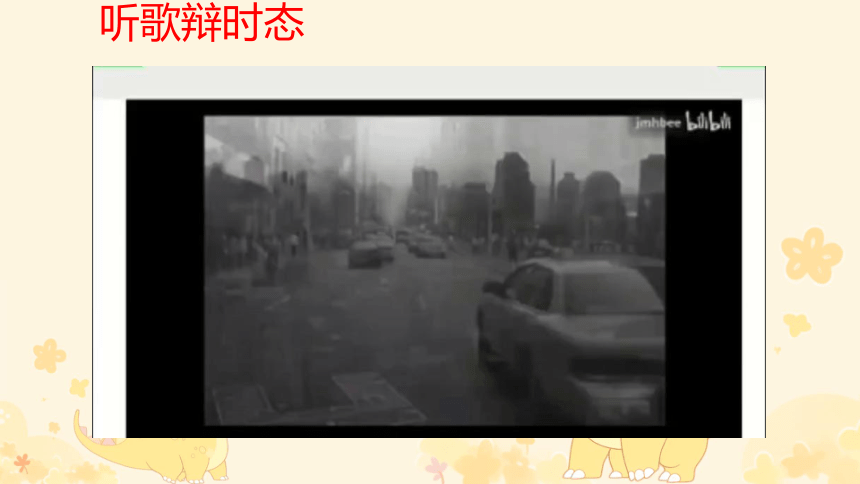
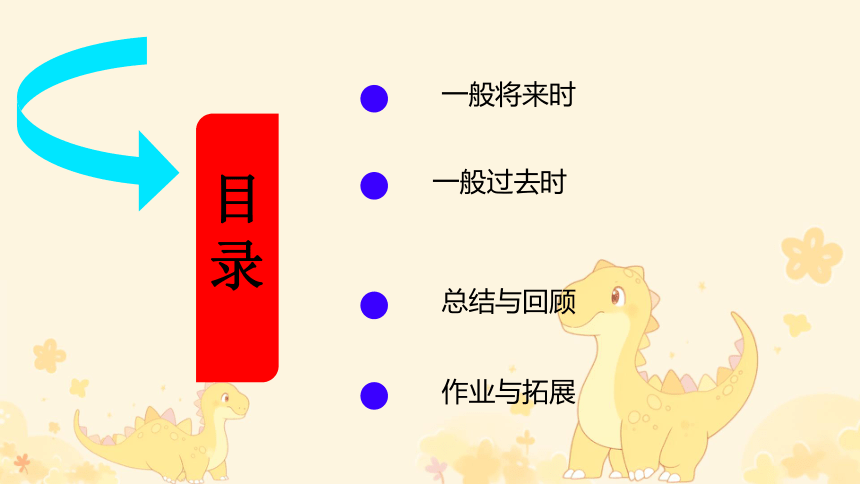
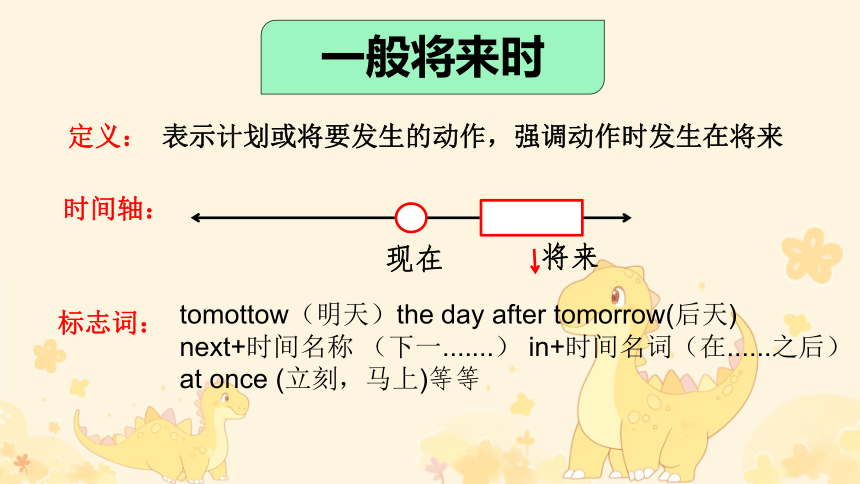

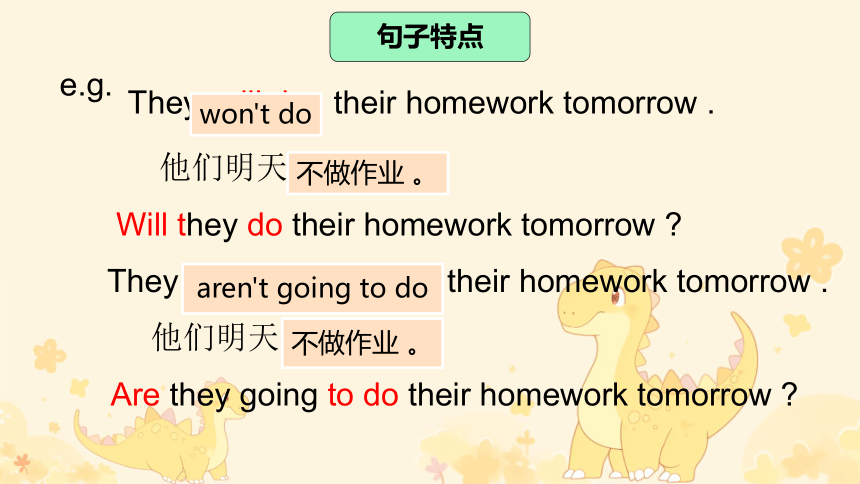
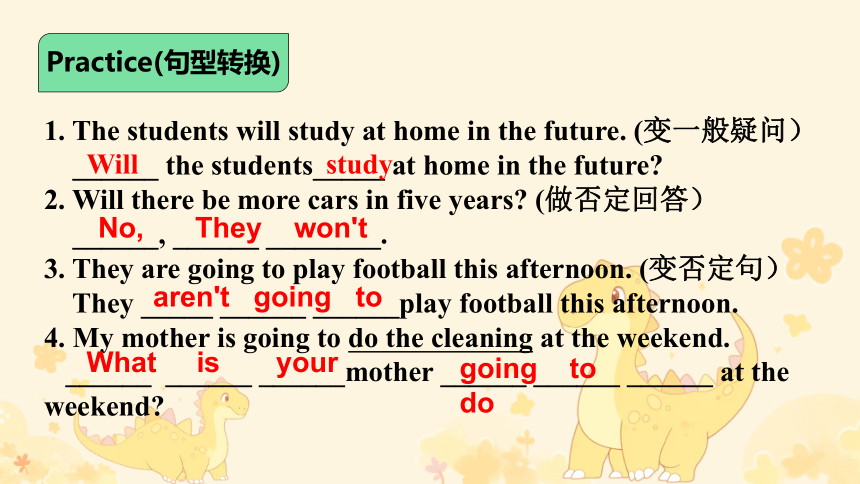
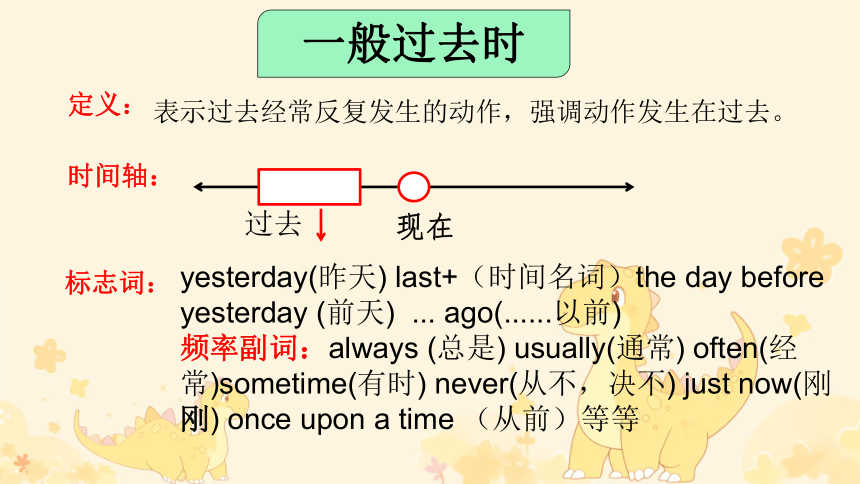
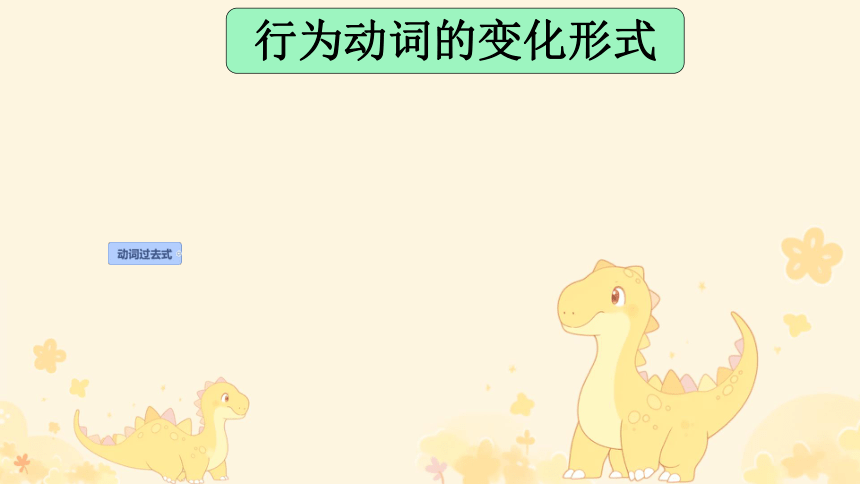
文档简介
(共20张PPT)
七年级外研版下册
本册综合语法之时态篇
一般将来时
一般过去时
听歌辩时态
一般将来时
一般过去时
总结与回顾
作业与拓展
目录
一般将来时
定义:
表示计划或将要发生的动作,强调动作时发生在将来
时间轴:
现在
将来
标志词:
tomottow(明天)the day after tomorrow(后天)
next+时间名称 (下一.......) in+时间名词(在......之后)at once (立刻,马上)等等
句子特点
一般将来时
S.+will+V,(动原)+其它.
S.+be going to +V.(动原)+其它.
S.+won't+V,(动原)+其它.
S.+be +not going to +V.(动原)+其它.
Will+S.+V,(动原)+其它
Be+ S.+going to +V.(动原)+其它
e.g.
They will do their homework tomorrow .
他们明天做作业。
They are going to do their homework tomorrow .
他们明天做作业。
won't do
aren't going to do
不做作业 。
不做作业 。
句子特点
Will they do their homework tomorrow
Are they going to do their homework tomorrow
1. The students will study at home in the future. (变一般疑问)
______ the students_____ at home in the future
2. Will there be more cars in five years (做否定回答)
______, ______ ________.
3. They are going to play football this afternoon. (变否定句)
They _____ ______ ______play football this afternoon.
4. My mother is going to do the cleaning at the weekend.
______ ______ ______mother ______ ______ ______ at the weekend
Practice(句型转换)
Will
study
No,
They won't
aren't going to
What is your
going to do
一般过去时
定义:
时间轴:
标志词:
表示过去经常反复发生的动作,强调动作发生在过去。
现在
过去
yesterday(昨天) last+(时间名词)the day before yesterday (前天) ... ago(......以前)
频率副词:always (总是) usually(通常) often(经常)sometime(有时) never(从不,决不) just now(刚刚) once upon a time (从前)等等
行为动词的变化形式
一、不规则动词的一般过去时
did/ didn't出现,动词打回原形
主 + 动(过) + 其它.
主 + didn't + 动(原) + 其它.
Did + 主 + 动(原)+ 其它
Yes, 主+did. / No, 主+didn't.
He became very famous later.
He didn't become very famous later.
Did he become very famous later
Yes, he did. / No, he didn't.
辨析:They didn't left Nanning during the summer holiday.
didn't leave
辨析:Did you went for a walk after dinner
go
二、如何判断时态用一般过去时?
诀窍一:关注句首/末的时间标志词
1. yesterday (昨天)
2. last+时间 (上一...)
3. ...ago (...以前)
4. just now (刚刚)
5. in + 过去年份 (在...年)
6. Once upon a time (从前)
诀窍二:关注句中的并列连词
1. He left school and ______(begin) work at the age of twelve.
2. She walked in the forest and ______ (pick) some flowers.
3. She didn't notice me then ______ (run) into the classroom.
began
picked
ran
Mike _______(walk) to school just now.
walked
did/ didn't出现,动词打回原形
Practice(句型转换)
I began school at the age of six.(肯定句变否定句)
We took a walk this morning.(肯定句变否定句)
She went to school by bus every day.(肯定句变疑问句)
They went to the park last Sunday.(肯定句变疑问句)
I didn't begin school at the age of six.
We didn't take a walk this morning.
She didn't go to school by bus every day.
Did they go to the park last Sunday
1. Last Sunday my aunt_____ at home with me. We were watching TV all day.
A. was B. were C. is
2. There_____ an interesting movie last night. Did you watch it
A. is B. were C. was
实战演练
中考链接
3. --Jerry, have you ever been to the Great Wall
---Yes. I ____ there with my parents last year.
A. go B. went C. will go
4. ---Look at my new smart phone.
--Wow, it's so cool! When and where ____ you ___it
A. do, buy B. have, bought C. did , buy
5. He ____ me his name, but I can't remember it now.
A. tells B. will tell C. told
6. --We ____ to Yun Brocade Museum with the exchange students this coming summer holiday.
---That's amazing!
A. went B. go C. will go
7. --You'd better take an umbrella. The weather report says it______ in the afternoon.
---Thank you. I will put one in my bag.
A. will rain B. rains C. is raining
8. There _________ a folk music concert in Xinjiang Opera Theatre next month.
A. is going to have B. will have C. is going to be
9. --What's your plan for next weekend, Lingling
--I ____ volunteer work in the museum.
A. was going B. did C.am going to do
10. In the near future, there ____ self-driving cars in our city.
A. is B. will be C. are
11. ____ a new movie at the cinema. Could you please go to the cinema with us
A. There B. There will be C. There will have
12.--How many children do most post-80s' families have
--One. They _____ two in the future, I guess.
A. will have B. had C. have
Summary
Homework
Thank you!
七年级外研版下册
本册综合语法之时态篇
一般将来时
一般过去时
听歌辩时态
一般将来时
一般过去时
总结与回顾
作业与拓展
目录
一般将来时
定义:
表示计划或将要发生的动作,强调动作时发生在将来
时间轴:
现在
将来
标志词:
tomottow(明天)the day after tomorrow(后天)
next+时间名称 (下一.......) in+时间名词(在......之后)at once (立刻,马上)等等
句子特点
一般将来时
S.+will+V,(动原)+其它.
S.+be going to +V.(动原)+其它.
S.+won't+V,(动原)+其它.
S.+be +not going to +V.(动原)+其它.
Will+S.+V,(动原)+其它
Be+ S.+going to +V.(动原)+其它
e.g.
They will do their homework tomorrow .
他们明天做作业。
They are going to do their homework tomorrow .
他们明天做作业。
won't do
aren't going to do
不做作业 。
不做作业 。
句子特点
Will they do their homework tomorrow
Are they going to do their homework tomorrow
1. The students will study at home in the future. (变一般疑问)
______ the students_____ at home in the future
2. Will there be more cars in five years (做否定回答)
______, ______ ________.
3. They are going to play football this afternoon. (变否定句)
They _____ ______ ______play football this afternoon.
4. My mother is going to do the cleaning at the weekend.
______ ______ ______mother ______ ______ ______ at the weekend
Practice(句型转换)
Will
study
No,
They won't
aren't going to
What is your
going to do
一般过去时
定义:
时间轴:
标志词:
表示过去经常反复发生的动作,强调动作发生在过去。
现在
过去
yesterday(昨天) last+(时间名词)the day before yesterday (前天) ... ago(......以前)
频率副词:always (总是) usually(通常) often(经常)sometime(有时) never(从不,决不) just now(刚刚) once upon a time (从前)等等
行为动词的变化形式
一、不规则动词的一般过去时
did/ didn't出现,动词打回原形
主 + 动(过) + 其它.
主 + didn't + 动(原) + 其它.
Did + 主 + 动(原)+ 其它
Yes, 主+did. / No, 主+didn't.
He became very famous later.
He didn't become very famous later.
Did he become very famous later
Yes, he did. / No, he didn't.
辨析:They didn't left Nanning during the summer holiday.
didn't leave
辨析:Did you went for a walk after dinner
go
二、如何判断时态用一般过去时?
诀窍一:关注句首/末的时间标志词
1. yesterday (昨天)
2. last+时间 (上一...)
3. ...ago (...以前)
4. just now (刚刚)
5. in + 过去年份 (在...年)
6. Once upon a time (从前)
诀窍二:关注句中的并列连词
1. He left school and ______(begin) work at the age of twelve.
2. She walked in the forest and ______ (pick) some flowers.
3. She didn't notice me then ______ (run) into the classroom.
began
picked
ran
Mike _______(walk) to school just now.
walked
did/ didn't出现,动词打回原形
Practice(句型转换)
I began school at the age of six.(肯定句变否定句)
We took a walk this morning.(肯定句变否定句)
She went to school by bus every day.(肯定句变疑问句)
They went to the park last Sunday.(肯定句变疑问句)
I didn't begin school at the age of six.
We didn't take a walk this morning.
She didn't go to school by bus every day.
Did they go to the park last Sunday
1. Last Sunday my aunt_____ at home with me. We were watching TV all day.
A. was B. were C. is
2. There_____ an interesting movie last night. Did you watch it
A. is B. were C. was
实战演练
中考链接
3. --Jerry, have you ever been to the Great Wall
---Yes. I ____ there with my parents last year.
A. go B. went C. will go
4. ---Look at my new smart phone.
--Wow, it's so cool! When and where ____ you ___it
A. do, buy B. have, bought C. did , buy
5. He ____ me his name, but I can't remember it now.
A. tells B. will tell C. told
6. --We ____ to Yun Brocade Museum with the exchange students this coming summer holiday.
---That's amazing!
A. went B. go C. will go
7. --You'd better take an umbrella. The weather report says it______ in the afternoon.
---Thank you. I will put one in my bag.
A. will rain B. rains C. is raining
8. There _________ a folk music concert in Xinjiang Opera Theatre next month.
A. is going to have B. will have C. is going to be
9. --What's your plan for next weekend, Lingling
--I ____ volunteer work in the museum.
A. was going B. did C.am going to do
10. In the near future, there ____ self-driving cars in our city.
A. is B. will be C. are
11. ____ a new movie at the cinema. Could you please go to the cinema with us
A. There B. There will be C. There will have
12.--How many children do most post-80s' families have
--One. They _____ two in the future, I guess.
A. will have B. had C. have
Summary
Homework
Thank you!
同课章节目录
- Module 1 Lost and found
- Unit 1 Whose bag is this?
- Unit 2 Are they yours?
- Unit 3 Language in use
- Module 2 What can you do ?
- Unit 1 I can play the piano
- Unit 2 I can run really fast
- Unit 3 Language in use
- Module 3 Making plans
- Unit 1 What are you going to do at the weekends?
- Unit 2 We're going to cheer the players.
- Unit 3 Language in use
- Module 4 Life in the future
- Unit 1 Everyone will study at home
- Unit 2 Every family will have a small plane.
- Unit 3 Language in use
- Module 5 Shopping
- Unit 1 What can I do for you?
- Unit 2 You can buy everything on the Internet
- Unit 3 Language in use
- Module 6 Around town
- Unit 1 Could you tell me how to get to the Nationa
- Unit 2 The London Eye is on your right.
- Unit 3 Language in use
- Revision module A
- Module 7 My past life
- Unit 1 I was born in a small village.
- Unit 2 I was born in Quincy.
- Unit 3 Language in use
- Module 8 Story time
- Unit 1 Once upon a time….
- Unit 2 Goldilocks hurried out of the house.
- Unit 3 Language in use
- Module 9 Life history
- Unit 1 He left school and began work at the age of
- Unit 2 He decided to be an actor.
- Unit 3 Language in use
- Module 10 A holiday journey
- Unit 1 What did you do?
- Unit 2 This morning we took a walk.
- Unit 3 Language in use
- Module 11 Body language
- Unit 1 They touch noses!
- Unit 2 Here are some ways to welcome them.
- Unit 3 Language in use
- Module 12 Western music
- Unit 1 It's so beautiful!
- Unit 2 Vienna is the centre of European classical
- Unit 3 Language in use
- Revision module B
